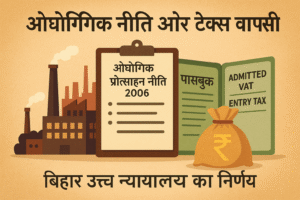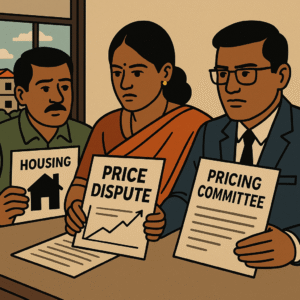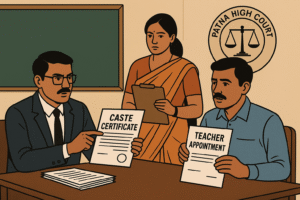In a recent case, the Patna High Court clarified that when disputes arise from government work contracts, particularly regarding penalties imposed for delays, parties must first use the arbitration mechanism or statutory tribunal before approaching the High Court. This decision reinforces the importance of contract terms and statutory remedies in infrastructure and public works disputes.
The petitioner, a contractor, approached the High Court to challenge a penalty of ₹33,63,925 imposed by the Road Construction Department (RCD), Bihar, for alleged delay in completing a road construction project. The department also suspended the contractor’s registration for two years, preventing participation in government tenders and causing significant financial losses.
The petitioner argued that the delay was not due to negligence but was caused by unavoidable circumstances, including Naxalite threats, local resistance, and severe floods. Despite these conditions, the contractor claimed to have completed the work and even submitted evidence to support the request for extension of time, which was recommended by various departmental officers and conditionally approved by the Chief Engineer.
However, the department still imposed a financial penalty and refused to return the petitioner’s security deposit and earnest money. The petitioner further argued that penalizing him financially after having already faced suspension amounted to “double punishment,” which is against the principles of natural justice.
Upon hearing the matter, the Patna High Court declined to examine the dispute under its writ jurisdiction (Article 226 of the Constitution of India). The Court observed that the issue involved detailed questions of fact—such as whether the delay was justified and who was at fault—which cannot be decided without a full-fledged fact-finding process.
Moreover, since the contract in question was a standard government work contract containing an arbitration clause, and a tribunal exists to resolve such disputes, the Court held that the petitioner must pursue the available contractual and statutory remedies first. Writ jurisdiction is not meant for such fact-heavy, technical contractual disputes unless exceptional circumstances exist.
The High Court disposed of the petition with liberty to the petitioner to approach the appropriate forum, such as an arbitrator or the tribunal constituted under the relevant statute. The Court also directed that if the petitioner files such proceedings, the competent authority must decide the matter expeditiously, in accordance with law.
Significance of the Judgment
This decision is significant for contractors, vendors, and government departments involved in public infrastructure projects. It re-emphasizes that:
- Writ petitions under Article 226 are not a shortcut to bypass arbitration or statutory mechanisms laid out in contracts.
- Contractors must preserve all correspondence, notices, and evidence of hardships like natural calamities or security threats if they seek relief.
- Government departments must avoid imposing financial penalties without offering a genuine opportunity to the contractor to explain the delays, especially where time extensions were conditionally allowed.
The judgment also serves as a cautionary tale for government authorities: even if their action appears legally valid, skipping procedural safeguards like arbitration can result in judicial pushback.
Legal Issue(s) Decided and the Court’s Decision with Reasoning
- Whether the High Court can adjudicate contractual disputes involving penalties under Article 226
✅ No. The Court held that such disputes involve disputed questions of fact and are not suitable for writ jurisdiction. - Whether the contractor has a remedy other than filing a writ petition
✅ Yes. The contract contains an arbitration clause, and there exists a statutory tribunal to adjudicate such matters. - Whether imposition of penalty after conditional time extension and suspension amounts to double punishment
🟡 The Court did not go into this aspect, noting that it requires factual determination better suited to arbitration or tribunal proceedings.
Case Title
Ravindra Kumar Singh vs The State of Bihar & Others
Case Number
Civil Writ Jurisdiction Case No. 639 of 2022
Coram and Names of Judges
Hon’ble Mr. Justice Sanjay Karol, Chief Justice
Hon’ble Mr. Justice S. Kumar
Names of Advocates and Who They Appeared For
Mr. Usha Kumari – Advocate for the Petitioner
Mr. Uday Shankar Sharan Singh (G.P.19) – Advocate for the Respondents
Link to Judgment
https://www.patnahighcourt.gov.in/ShowPdf/web/viewer.html?file=../../TEMP/068af1f3-3f88-40b3-a170-60bc2c41267e.pdf&search=Debarment
If you found this explanation helpful and wish to stay informed about how legal developments may affect your rights in Bihar, you may consider following Samvida Law Associates for more updates.








